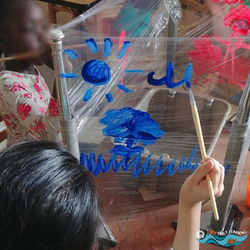
"But all you do is play!"
Young children are naturally curious active learners who learn by doing, moving, talking and engaging in interactions with adults, other children, and their environment.
Edmonton Catholic Early Learning continues to be inspired by the Reggio Emilia child-centred approach that encompasses the nature of learning and teaching. Our philosophy embraces inquiry and exploration within a play-based environment. As children are actively engaged, they are clarifying information, integrating ideas from previous experiences, and exploring and experimenting with their environment. They develop their imagination, creativity and ability to solve problems.
Children are encouraged to explore and express themselves through a variety of graphic languages. Documentation is an important component, focusing on capturing the always moving learning process. The teacher is in the role of researcher, constantly evaluating and interpreting ongoing learning processes. The relationship of the parent in the life of the child and school is highly valued.
In Early Learning programs, children actively engage in organized activities, purposeful play, and inquiry-based learning through exploration of materials and their environment. Learner expectations are integrated through learning activities that are developmentally appropriate for young children. Early Learning programming addresses young children’s social, emotional, intellectual, physical, and creative needs.
 |  |  |
|---|---|---|
 |  |  |
 |  |
LITERACY & NUMERACY
This time allows children time to make connections between their world and the various topics explored in class
• It provides opportunities for children to express themselves in multiple ways
• Daily literacy activities may include: read alouds, shared reading, guided reading, work on writing, reading conferences, paired reading, phonemic awareness and word work
• Numeracy activities may include: numeracy investigations, number talks, guided math tasks, math mini lessons, inquiry-based projects (sorting, counting, patterning)
• Many of these opportunities will occur naturally throughout the day as the children seek to find out more information about the areas that they are exploring
• Literacy and numeracy activities can occur in small groups and naturally through play
DAILY PHYSICAL ACTIVITY
• Allows children the opportunity to grow as ethical citizens by engaging in a variety of social interactions and problem solving opportunities on the playground and in the classroom
• Indoor and outdoor daily physical activity may include yoga, dance, and gross motor activities (running, jumping, skipping, and ball play) to support children in caring for themselves physically, emotionally, intellectually, socially and spiritually
• Frequent movement breaks are needed for children of this age group to sustain concentration, attention and engaged learning
• Daily opportunities for learning and playing in an outdoor environment is highly recommended
DISCOVERY CENTERS & INQUIRY PROJECTS
• Allow children choice and flexibility to become entrepreneurial spirits as they choose areas of interest and the amount of time they wish to explore, so that they can create theories and explore in more detail the world around them
• Allow time for children to construct their own understanding of the world around them through play by using problem solving and decision making skills
• Learning areas are open ended and authentically related to what the children are exploring and will ebb and flow, changing throughout the year as they grow as engaged thinkers
• Provocations are provided to peak children’s natural curiosities and provide opportunity from them to think critically and creatively and make discoveries
• Materials should be provided in various spaces to allow the children to record and communicate their thoughts and ideas
CLASS MEETINGS & REFLECTIONS
• Setting the stage for the day for critical thinking and problem solving by allowing opportunities to talk, ask questions, collaborate and communicate (This should include a balance of activities such as song, movement, story and conversation)
• Becoming ethical citizens by building a sense of community through prayer, building trust, respect and friendships (This is an opportunity to engage in learning about faith and Liturgical seasons)
• The teacher sets the stage for engaged thinking by introducing various provocations/projects that are occurring
• Conversations throughout the day allow for critical thinking, problem solving and decision making as teachers and children reflect on their learning and develop further questions for investigation (This may include communication in the form of shared writing, prayer and conversation)
